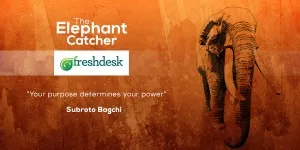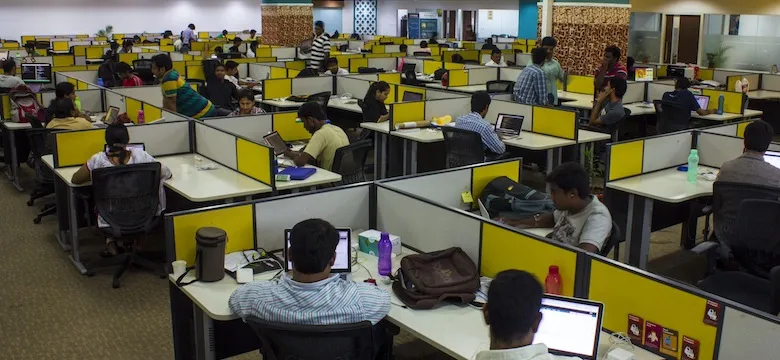“It is possible to build a billion-dollar SaaS product company out of India” - Girish Mathrubootham, Freshdesk
The Elephant Catchers – Stories of startups scaling and growing big

We had captured their startup story; it’s now time to chronicle their growth journey. While starting up has a unique story of its own, I believe growing and scaling a venture makes for a different narrative. Starting this week, we will bring you stories of Scaling up. I shared this idea with Girish, and he was prompt enough to participate, and give us an inside peek into scale and how he is managing the high velocity growth that his company is witnessing.
Our heartfelt gratitude is due to the inimitable Subroto Bagchi, for magnanimously lending us the name of his latest bestseller, The Elephant Catchers, for this series on scale. Like Subroto mentions in his book, “Your purpose determines your power.” We believe startup entrepreneurs are driven by a purpose, and we will together unravel how they go on to build a powerhouse.
Here, Girish speaks about the challenge and opportunity that scale has brought inside Freshdesk.
People
When you are adding 8 to 10 new people a month – that too from different companies – keeping everyone tuned in to the company’s culture and value system itself is a significant challenge. I personally meet all our new hires every month to discuss the Freshdesk culture and values.

Hiring
We are close to 150 people now. Most people think of startups as 5-10 people sitting in a room and coding away. While we had our share of fun, we are what Paul Graham would describe as a “high growth” startup. We hire mostly thru referrals. We hire mostly experienced product folks or freshers. We also hire other startup folks. For example, everyone knows that SnapDeal acquired Shopo. Very few people know that almost the entire Shopo team including the CEO Taggy is now at Freshdesk. The co-founder of Yo-Potato Pavan is with Freshdesk.
Letting go
We do not have a specific firing policy. But when things are not working out, we talk to the employee and try to help. We consider things like team change, role change etc. If things still don’t work out, we talk to them and help them exit gracefully. I am still friends with people whom we have fired. It is important that we learn to separate passion and emotion.
Culture
We have a culture of learning by doing. Our core platform is Ruby on Rails. Will you believe if I tell you that employee number 69 was the first person who knew Ruby on Rails at the time of joining Freshdesk. We work on cutting edge stuff like AWS, Amazon RedShift, node.js, backbone.js etc., but we don’t do any formal classroom trainings. We hire smart programmers who pick up stuff on the go.
Evolving goal
When we started, our first goal (like any startup entrepreneur) was to hit 5K - 10K USD in revenues, so that we can hit break-even with our meagre burn. As we started winning more and more customers globally, competing against the best companies in the globe, we started to believe that we are on to something big and that it is possible.
Processes
Obviously, with thousands of customers, your development and deployment slows down, because you can’t afford to break something that’s working. We have QA processes, deployment processes etc., which can be seen as slowing you down compared to early startup days, but are essential when you are growing fast and supporting customers.
Market and merit of inbound marketing
The market has become more aware of the need for social support. The response has been fantastic. We now have one of the best products in the space. Almost all of our marketing is inbound.
Changes with an investor coming on board
Let me share a simple example that I realised along the way. As an entrepreneur, if you invest 10,000, you will expect to earn revenues of 30,000 or 40,000 to be considered a successful businessman. As a VC-funded business, if you invest 10,000 to earn 6,000 in revenues and the company value is 12 X 6,000 = 72,000, then you are considered successful. Of course, the assumption is that with scale you get profitability, and it has been demonstrated enough.
Once you understand this math, then you really start appreciating the value in thinking big and aiming high. It is really hard to continuously grow every month and every quarter, but it is a great experience and well worth it. Also, having a good investor helps us in having a sounding board to validate our plans and ideas. While we may not be able to implement every idea our investors bring to the table, we definitely have got some solid insights.
Starting up and then scaling up
When you are starting up, you are looking for product launch, product market fit, acquiring your first few customers, funding etc. As a VC-funded startup that is scaling fast, you are essentially building a business. You start to understand the importance of all the other departments (versus focusing on only the product). There is a constant need to balance the short-term versus long-term (dealing with customers who want a feature or have a problem versus focusing on building out your long-term roadmap). It is like a complex chess game with several pieces coming into play to execute on our strategy.
Motivation
The fact that there is a great potential to build this big and the fact that we have assembled one of the best product teams in India is what is keeping us motivated that we have a real shot at building a billion-dollar SaaS product company out of India.
Girish is part of a new generation of elephant catchers emerging from India and I believe their story will continue to grow.







